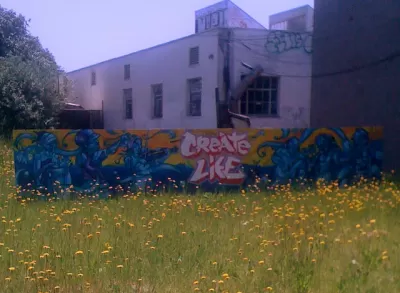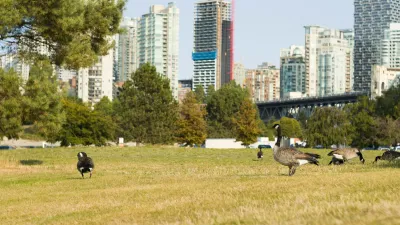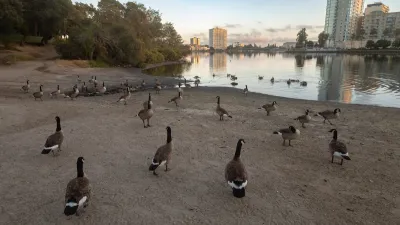A new book argues in favor of spontaneous, informal natural spaces.

Bloomberg CityLab's Linda Poon interviews Matthew Gandy, author of Natura Urbana: Ecological Constellations in Urban Space. The book "explores the longstanding cultural and scientific fascination" with "the 'unintentional nature' that springs up in urban spaces and is often neglected by humans." Inspired by an "accidental garden" that sprung up in a bombed-out lot in his inner London neighborhood, Gandy makes the argument that liminal, marginal, 'accidentally natural' spaces in cities "not only serve as mini laboratories for studying urban biodiversity, but can also reveal as much about a city’s history and political tensions as ruins, or the intentionally built environment."
Gandy also highlights the importance of nature in central cities as an equity issue:
Poor neighborhoods or ethnic minority neighborhoods in cities are often much more poorly served by access to parks and public space than richer neighborhoods. And for people of color, some parks and public spaces do not feel very safe or welcoming, and often this is even more the case if people travel outside of cities to rural or non-metropolitan spaces of nature. Therefore, urban nature in the heart of the city is much more open to a diverse public.
A critical analysis of the human-nature relationship is urgently needed, says Gandy. "[S]ince more than half the global population now live in cities, if we don’t have a better relationship with and understanding of urban nature, how will we build different responses to environmental questions more generally?"
FULL STORY: The Case for Preserving Spontaneous Nature in Cities

Maui's Vacation Rental Debate Turns Ugly
Verbal attacks, misinformation campaigns and fistfights plague a high-stakes debate to convert thousands of vacation rentals into long-term housing.

Planetizen Federal Action Tracker
A weekly monitor of how Trump’s orders and actions are impacting planners and planning in America.

San Francisco Suspends Traffic Calming Amidst Record Deaths
Citing “a challenging fiscal landscape,” the city will cease the program on the heels of 42 traffic deaths, including 24 pedestrians.

Defunct Pittsburgh Power Plant to Become Residential Tower
A decommissioned steam heat plant will be redeveloped into almost 100 affordable housing units.

Trump Prompts Restructuring of Transportation Research Board in “Unprecedented Overreach”
The TRB has eliminated more than half of its committees including those focused on climate, equity, and cities.

Amtrak Rolls Out New Orleans to Alabama “Mardi Gras” Train
The new service will operate morning and evening departures between Mobile and New Orleans.
Urban Design for Planners 1: Software Tools
This six-course series explores essential urban design concepts using open source software and equips planners with the tools they need to participate fully in the urban design process.
Planning for Universal Design
Learn the tools for implementing Universal Design in planning regulations.
Heyer Gruel & Associates PA
JM Goldson LLC
Custer County Colorado
City of Camden Redevelopment Agency
City of Astoria
Transportation Research & Education Center (TREC) at Portland State University
Jefferson Parish Government
Camden Redevelopment Agency
City of Claremont





























